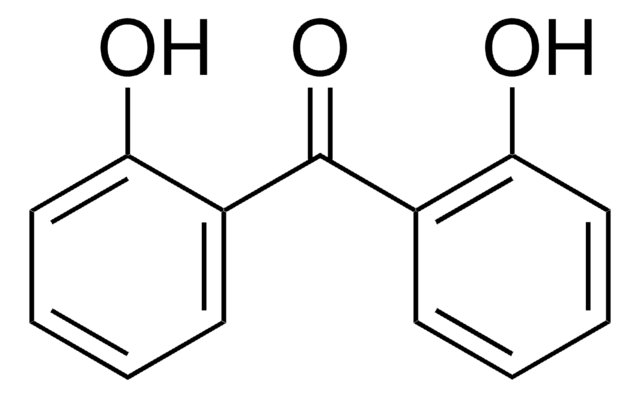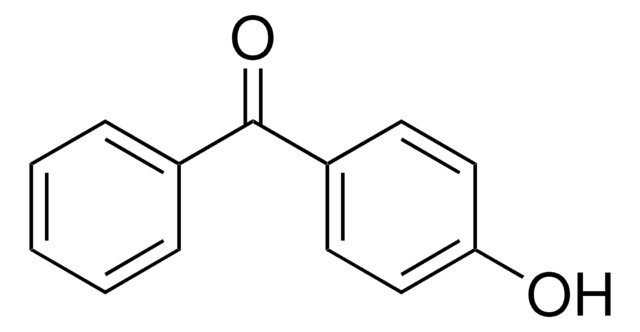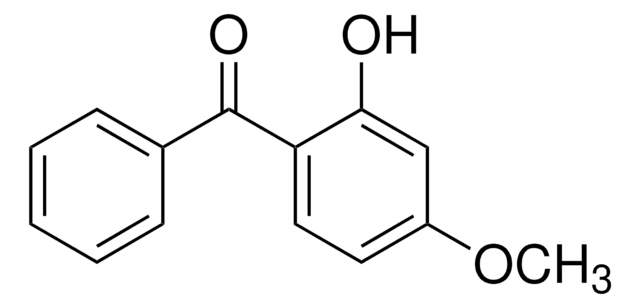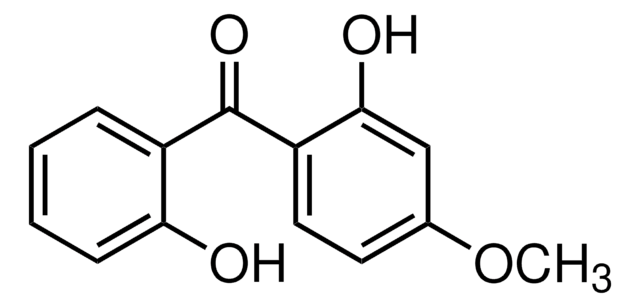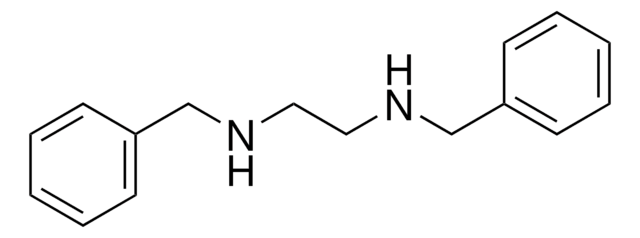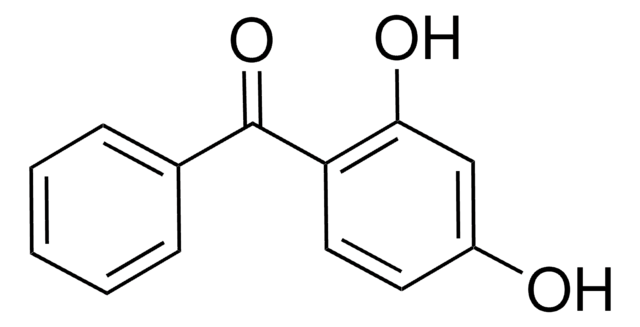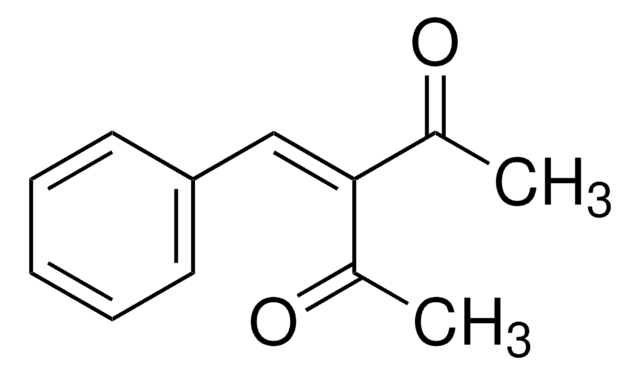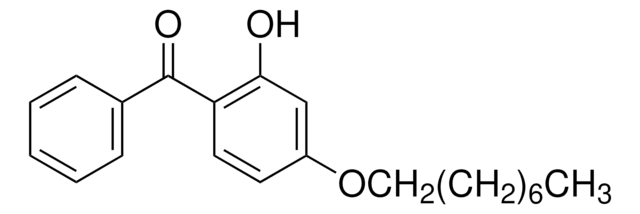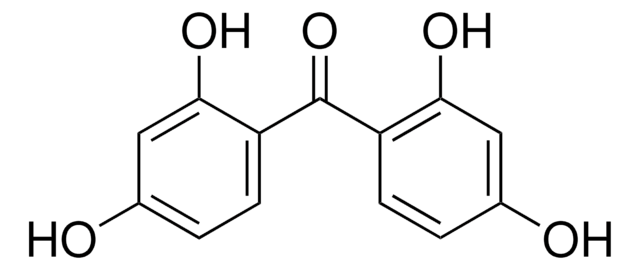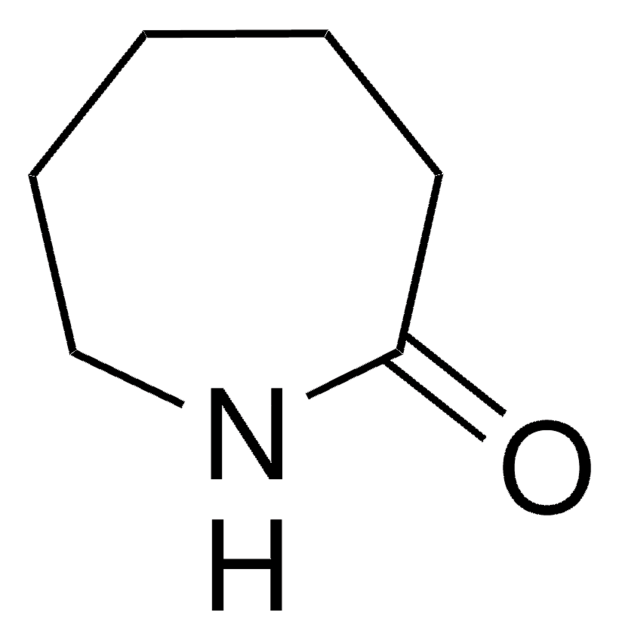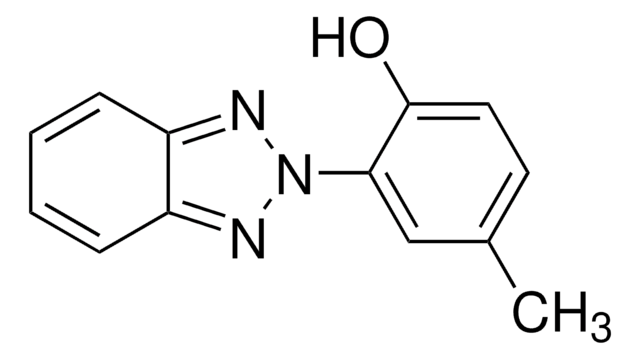103160
2-Hydroxybenzophenone
99%
Se connecterpour consulter vos tarifs contractuels et ceux de votre entreprise/organisme
About This Item
Formule linéaire :
HOC6H4COC6H5
Numéro CAS:
Poids moléculaire :
198.22
Numéro CE :
Numéro MDL:
Code UNSPSC :
12352100
ID de substance PubChem :
Nomenclature NACRES :
NA.22
Produits recommandés
Niveau de qualité
Essai
99%
pb
171-173 °C/12 mmHg (lit.)
Pf
37-39 °C (lit.)
Groupe fonctionnel
ketone
phenyl
Chaîne SMILES
Oc1ccccc1C(=O)c2ccccc2
InChI
1S/C13H10O2/c14-12-9-5-4-8-11(12)13(15)10-6-2-1-3-7-10/h1-9,14H
Clé InChI
HJIAMFHSAAEUKR-UHFFFAOYSA-N
Catégories apparentées
Description générale
- 2-Hydroxybenzophenone forms copolymer 2-hydroxy, 3-allyl, 4,4′-dimethoxybenzophenone with methyl methacrylate.
- It forms photostabilizer compounds with 2,2,6,6-tetramethylpiperidine under phase transfer catalysis conditions.
- It reacts with 3-aminophenyl boronic acid to form macrocyclic boronates.
Application
2-Hydroxybenzophenone was used to quantify the metabolites of unmethylated extracts from the supernatants of Pseudomonas acidovorans cultures grown on 1,1-diphenylethylene.
Code de la classe de stockage
10 - Combustible liquids
Classe de danger pour l'eau (WGK)
WGK 3
Point d'éclair (°F)
235.4 °F - closed cup
Point d'éclair (°C)
113 °C - closed cup
Équipement de protection individuelle
Eyeshields, Gloves, type ABEK (EN14387) respirator filter
Faites votre choix parmi les versions les plus récentes :
Déjà en possession de ce produit ?
Retrouvez la documentation relative aux produits que vous avez récemment achetés dans la Bibliothèque de documents.
Les clients ont également consulté
Synthesis and application of new combined 2, 2, 6, 6-tetramethylpiperidine-2-hydroxybenzophenone 1, 3, 5-triazine derivatives as photostabilizers for polymer materials
Bojinov V and Grabchev I
J. Photochem. Photobiol., A, 146(3), 199-205 (2002)
New boron macrocycles based on self-assembly of Schiff bases
Barba V, et al.
Journal of Organometallic Chemistry, 622(1), 259-264 (2001)
Vanessa Giannetti et al.
Journal of the science of food and agriculture, 97(7), 2191-2198 (2016-11-02)
The lack of harmonized European legislation on food packaging led the Confederation of European Paper Industries to the proposal of a voluntary Industry Guideline for the compliance of paper and board materials for food contact applications. In the present work
Transient absorption spectra of 2-hydroxybenzophenone photostabilizers
Merritt C, et al.
Chemical Physics Letters, 69(1), 169-173 (1980)
A G Hay et al.
Applied and environmental microbiology, 64(6), 2141-2146 (1998-06-03)
1,1-Dichloro-2,2-bis(4-chlorophenyl)ethylene (DDE), a toxic breakdown product of 1,1,1-trichloro-2,2-bis(4-chlorophenyl)ethane (DDT), has traditionally been viewed as a dead-end metabolite: there are no published reports detailing enzymatic ring fission of DDE by bacteria in either soil or pure culture. In this study, we
Notre équipe de scientifiques dispose d'une expérience dans tous les secteurs de la recherche, notamment en sciences de la vie, science des matériaux, synthèse chimique, chromatographie, analyse et dans de nombreux autres domaines..
Contacter notre Service technique